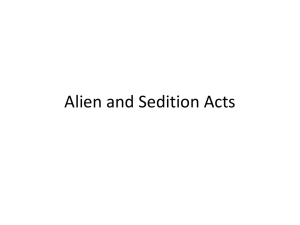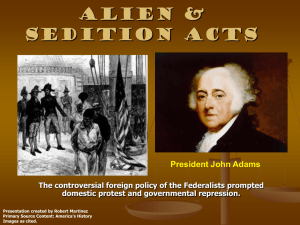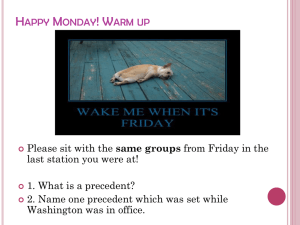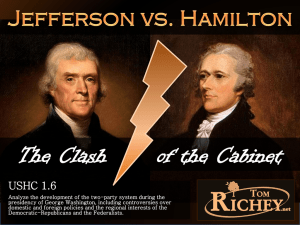Economics
advertisement
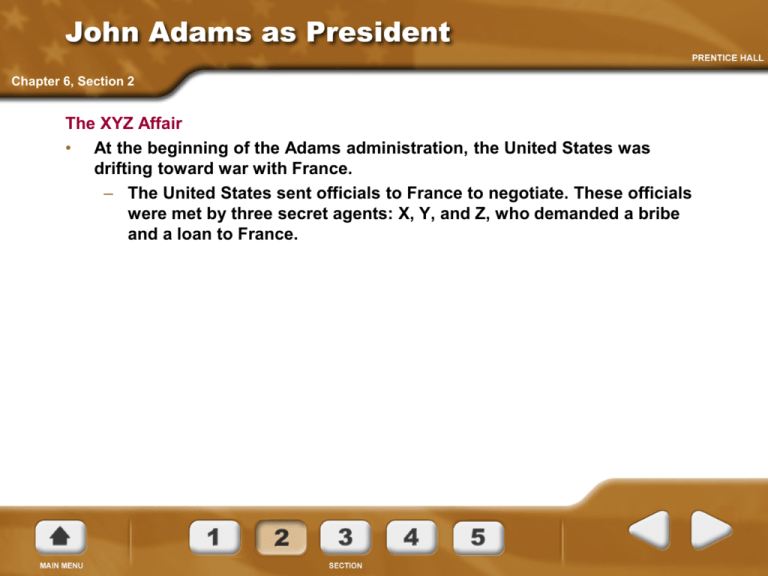
John Adams as President Chapter 6, Section 2 The XYZ Affair • At the beginning of the Adams administration, the United States was drifting toward war with France. – The United States sent officials to France to negotiate. These officials were met by three secret agents: X, Y, and Z, who demanded a bribe and a loan to France. • The U.S. officials refused to pay the bribe and were met with public acclaim for their patriotism upon their return home. – This XYZ affair infuriated Americans, resulting in what amounted to an undeclared naval war with France. The Alien and Sedition Acts • The Federalists took advantage of the war crisis to push important new measures through Congress. These included the Alien and Sedition Acts of 1798. • Under the Alien Act, the President could imprison or deport citizens of other countries living in the United States. • Under the Sedition Act, persons who wrote, published, or said anything “false, scandalous, and malicious” against the American government could be fined or jailed. Increasing Tensions Chapter 6, Section 2 • Jefferson, James Madison, and other Republicans believed that the Sedition Act violated the constitutional protection of freedom of speech. • These men responded to the Alien and Sedition Acts with the Virginia and Kentucky Resolutions. The resolutions allowed these two states to nullify federal laws which they felt were unconstitutional. Tensions Rise • Tensions between Federalists and Jeffersonian Republicans continued to grow during the late 1790s. • Enslaved African Americans, although barred from participation in the political system, embraced the discussions of liberty going on around them. A blacksmith named Gabriel Prosser and several other slaves in the area around Richmond, Virginia attempted a slave revolt. Prosser’s small-scale rebellion failed before it could get underway. Adams Loses Federalist Support Chapter 6, Section 2 • Adams angered many Federalists when he sought a peaceful solution to the undeclared naval war with France. – Federalists such as Alexander Hamilton were in favor of a harsher policy toward France • including a declaration of war. • Adams entered the election of 1800 with several disadvantages. – First, when the United States made peace with France, the Jeffersonian Republicans’ support for France became less of a rallying point for the Federalists. • Also, the unpopular Alien and Sedition Acts became even less justified without the threat of imminent war. • Adams’s bid for re-election was further damaged when Aaron Burr, the Jeffersonian Republican nominee for Vice President, obtained and printed a damaging pamphlet against Adams written by Hamilton. The Campaign and Jefferson’s Victory Chapter 6, Section 2 The Campaign • By 1800, Thomas Jefferson emerged as the leader among those who preferred local to national government. • Jefferson ran against Adams in what became a nasty presidential campaign. • Jefferson’s campaign accused Adams of being a monarchist. Adams’s campaign claimed that Jefferson would lead the nation into chaos. Jefferson’s Victory • Jefferson won the popular vote but did not win a majority in the electoral college. He tied with his vice presidential running mate, Aaron Burr. • As specified in the Constitution, the House of Representatives voted to choose the President. Voting was deadlocked until the House elected Jefferson on its thirty-sixth ballot. • Jefferson’s victory was aided by the support of his usual nemesis Hamilton, who preferred Jefferson over Burr. A Peaceful Transfer of Power Chapter 6, Section 2 • Jefferson took the oath of office on March 4, 1801, amid the construction of the nation’s new capital. • The Federalists peacefully stepped down and allowed the Jeffersonian Republicans to take power. In doing so, they proved that the American system of government was receptive to peaceful transfers of power.

